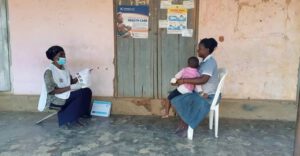Member Spotlight: Living Goods
Community Health in the Time of COVID-19: Reducing Preventable Deaths
By Jennifer Hyman, Director of Communications, Living Goods
Figuring out how to continue delivering essential reproductive, maternal, newborn and child health (RMNCH) services in the face of COVID-19 is an urgent priority, given the dire potential for preventable deaths among these groups to well exceed those from the pandemic itself, and our past experience of a similar tragedy during the Ebola outbreak. Restrictions on public transport, real and perceived fears of increased infection risk at formal health facilities, and a host of other factors have increased demand for quality community-based care. But Community Health Workers (CHWs) and the families they serve are typically in close contact, necessitating an increased focus on behavior change and adjusted protocols to prevent them from becoming vectors for transmitting a highly contagious respiratory disease and keep all parties safe.
Living Goods supports networks of government CHWs in Kenya and Uganda to assess and treat children under age 5 for malaria, diarrhea, and pneumonia; provide maternal and newborn care; deliver family planning education and commodities; and drive demand for essential immunization services. We both directly manage programs that equip CHWs with robust mHealth tools, essential medicines and family planning commodities, supportive supervision, and motivating compensation—while also concurrently influencing governments to infuse these components into their national community health programs.
Our strong focus on digital technology enabled us to immediately pivot during the current pandemic to delivering RMNCH services through adjusted low and no-touch protocols, which rely heavily on delivering many services via telemedicine, with CHWs following the prompts on their apps to make presumptive diagnoses and treatment recommendations, a

“When I’m assessing children, I use a mask, gloves and keep a distance,” explains Cissy Nabasumba, a CHW from Uganda’s Masaka district. “The biggest challenge I have faced so far is that people do not easily change behaviors, so we have to keep sensitizing and educating them about hand washing and maintaining a distance from other people.”
nd referrals for facility care when appropriate. We also built new workflows into the diagnostic app, so all assessments now begin by screening the individual and household for COVID-19-related symptoms. Living Goods is also providing all essential medicines for free during this phase of the pandemic to ensure that cost is not a barrier to care, and CHWs are providing these medicines via “contactless” delivery.
We have procured sufficient PPE to support CHWs to safely deliver services according to these adjusted protocols, which are based on each government’s plans for how to engage CHWs in responding to the outbreak. In Uganda, this includes cloth and surgical masks, gloves, rubbing alcohol, and soap, which is suitable for no-touch engagements by phone or at a distance. Meanwhile, as the Kenya Ministry of Health has requested that CHWs continue to provide rapid malaria tests in endemic areas and might engage them in supporting home-based care of COVID patients that are asymptomatic or experience mild symptoms, we are also procuring additional PPEs including aprons and goggles.
Time will tell how intensely COVID-19 will affect the African continent. But we must urgently ensure that health systems are not further decimated by the intense strain this pandemic will inevitably cause. The best way to protect already fragile health systems from further strain is to fully maximize CHW workforces, ensure their needs are fully considered in government PPE budgets and equip them with the digital technology, treatments, supervision, and compensation they need to thrive and effectively supplement facility-based care.
About Living Goods
Living Goods is a nonprofit that saves lives at scale by supporting digitally empowered community health workers who deliver care on call – making it easy for families in need to get the care they need. Living Goods works with governments and partners to ensure community health workers have access to the digital technology, medical treatments, supervision and compensation to cost-effectively deliver high quality, impactful health services. At the end of 2019, Living Goods was supporting more than 10,000 CHWs to deliver care to more than 7 million people. Learn more at www.livinggoods.org